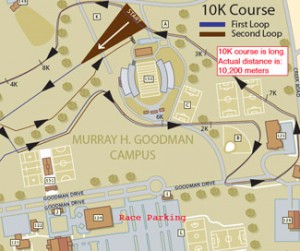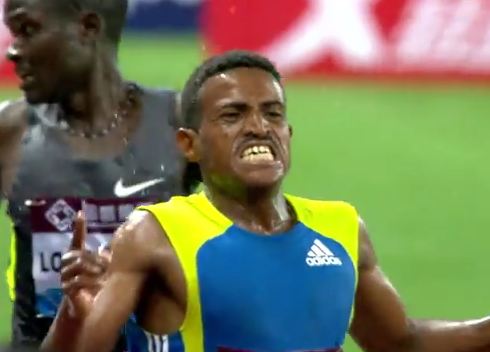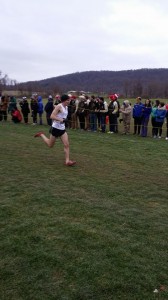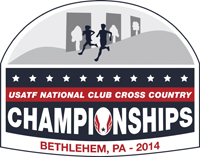Bad News, 2014 USATF Club XC Participants – The Course Was Short, Not Long
By Steve Soprano, Employee 1.1
December 17, 2014
Editor’s note: Employee 1.1 Steve Soprano has written this column after competing at the 2014 USATF Club Cross-Country Championships where he ran the “10.2k” course in 31:45.86 and placed 149th. This column to us is the perfect example of what type of person makes a good LetsRun.com employee – someone who is so passionate about the sport (others might say mentally insane) that they ran an XC course over and over after the race is over so they can invalidate the fast time they supposedly ran on it. Our only complaint is Steve violated LetsRun.com co-founder Robert Johnson‘s #1 mantra about XC – times are meaningless on grass courses.
Search your feelings, you know it to be true. The 2014 USATF Club Cross-Country Championships course was short, not long.
Maybe you were like me on Saturday. After the race, I had a hard time answering people who asked me how it went. I told them I wasn’t too happy with where I placed (relative to the field and some competitors I know), but that the time (if it was actually a full 10K … and the race website had claimed it was 10,200m) was surprisingly good. I ran 31:45 and before the race I would have predicted I was in around 31:30 to 31:50 10,000 shape on the track/road. So 31:45 on a grass XC course with some hills on a windy day … that could be worth something close to or better than my 31:02 track PR from college. And that’s assuming the course was 10K, let alone 10.2K.
Then my brain took over and I thought, “Wait … I ran a marathon in October and haven’t run much for mileage/workouts since, and I’m in near-PR shape? That doesn’t make any sense.” As they always say, if something seems to good to be true, it probably isn’t.
 They were right about it being 200m off … it just wasn’t long.
They were right about it being 200m off … it just wasn’t long.
With those thoughts in my head, I took it upon myself to wheel the course the day after the race. Yes, my fellow club runners, I ran around pushing a wheel for 15 miles just for you.
I measured it to be 32,041ft, which equals about 9,766m. I actually measured two ways, the whole thing straight through and in pieces (start, loop, loop connector and finish) and got the same number with both methods.
Women, sorry – you aren’t off the hook either. I measured your course (again, with two methods, one straight through and the other measuring the difference your extra turn added to one guy’s loop and doing the math) and with one method I got 19,139ft and the other was 19,132ft. So that’s a range of 5,831 to 5,834m.
My measurements (which I checked twice) left the men’s course 234m short of the traditional 10K and 434m short of the 10.2K claimed on the course map and race website; and the women’s course 166m short of 6K.
However, I did find out after the fact that my wheel was a little short. I ran on the Lehigh track for a couple of laps to check the wheel’s accuracy. The first lap I tried to stay in the middle of the lane where I incorrectly thought you were supposed to measure from, but in reality you are supposed to do it 30 cm from rail. Running it that way I got about 1,310 ft., which equals 399.3m. The second time I ran the wheel as close to the rail as I could get it and got 1,305 ft., which equals 397.8m. Just outside the curb, the track should be 399.06m so it looks like my wheel was off by 2.06 meters every 397.8.
So my wheel was a little bit off. But even if you assume that my wheel was 2.06 meters short every 397.8m, then that would only be 50.6m over the entire men’s course and 30.2m for the women. So our course would still only be 9,817m for the men and between 5,841 and 5,844 for the women. And yes, I admit, my method of measuring was not perfect. You should technically walk with the wheel, not run. However, even assuming that there was another 100ft (30m) of human error (unlikely, but possible) the course would only be 9,847m. Still well short of 10,000 and incredibly short of 10,200.
But hey, some good news. Measuring the course, I cut all the tangents and took all the turns on the inside as one should do when measuring the course (see links here and here). But most runners, including yours truly, were nowhere near the lead and thus were forced to go wide at times or not take the most direct route on the course. This would add some more distance, but unless you made a wrong turn and got lost, you didn’t run 10,000m, and certainly not 10,200m.
Why It Matters
I already know what many of you are going to say: “It’s cross country, time and distance don’t matter, blah blah blah …” And you’re mostly right; I don’t disagree. I raced without a watch on Saturday and it felt great; I don’t care about splits in XC. Very often, unless it’s a specific course you’ve run multiple times, your time really only matters relative to your competitors, not to the distance. However, an exception to that is when you run exceptionally fast.
Why doesn’t time matter in XC? It’s because every course is different (hills, mud, grass, cinder, turns, etc.), and even the same course can run way faster or slower in different conditions. So it’s very hard to figure out what an XC time really means. You’re always going to run much slower on an XC course compared to the track or road anyway. However, if you drop a fast time on an (accurate) XC course, that means something. For me, I wouldn’t have had to know exactly what a 31:45 XC 10K at Lehigh was equivalent to for it to be significant. I would just know I could run a lot faster on the road or track.
 “I did not run a 21:04 8K in a puddle of mud.”
“I did not run a 21:04 8K in a puddle of mud.”
Case in point – after the 2013 World Cross-Country Championships, the IAAF wrote an article about how amazing Hagos Gebrhiwet‘s 21:04 “8K” time was and started comparing him to Kenenisa Bekele. We published our own article explaining that the course was way short and there’s no way he ran that fast on an XC course because it would have been almost humanly impossible.
But what if it hadn’t been so glaringly obvious his time was too fast? If it had been somewhat reasonable, the mistake might not have been caught and people would have continued to put too much stock in this “stunningly fast” time. Knowing the true distance lets everyone disregard the time when analyzing the performance, as they should on a muddy, hilly cross-country course.
What Should Be Done
In running, no matter what, people are going to look at and talk about the times. If XC times are so unimportant, then why does everyone have an “8K cross” PR? Why do high schoolers tell you their 5K XC PR? They matter at least a little bit, especially to the people running. So in my mind, there are two options:
1) Try to be somewhat accurate. XC races are not record-eligible like the road/track, so if you’re off by 20m or so, not a huge deal. But try and make it close. If you measure it at 9.8K and can’t find a way to add another .2, then just call it 9.8K. It doesn’t have to be a nice round number in XC.
2) Do away with the distance on the results page all together. Screw it, don’t call it an 8K or 10K or 6K. The results can just be names and times, we don’t need the distance. Advertise the race as “Something around 6 miles … we’re not sure exactly.” Then everyone can throw away their time goals, not bother analyzing the times in the results, and just focus on the race. Don’t advertise 10.2K, and then give a course that is more than 400m short of that.
Personally, I prefer the first option. I’d like to know how far I ran, if for no other reason so my weekly mileage is accurate. I don’t care if you make the race 9.8K or 10.2K, just someone tell us (accurately) what it is. It’s not that hard. Have someone on the local organizing committee (who knows what they’re doing) go out for a six-mile jog with a wheel. It won’t be perfect, but it’ll probably be close enough.
Personal Plea To (Road) Race Directors Of America
Having an inaccurate course is one of the things that pisses me off the most about going to races. I’m talking road here, not XC, but as long as I was on the topic of course measurement I figured I’d vent. I swear, when it comes to local stuff, I’ve run more races that were inaccurate than ones that were actually the distance advertised. I once ran a USATF-certified 5K where I broke my track PR by about 30 seconds despite the hilly course, it being 20 degrees, and the fact that I was in terrible racing shape coming off a stress fracture. I also managed to run the first “mile” faster than any previous mile of my life.
There’s really no excuse for having an inaccurate road race and in my mind, if you are putting on a “5K” and your race is not actually 5 kilometers then you’ve already failed. I seem to be in the minority with this though. I once ran a low-key “5K” organized by a former All-American and was shocked when I finished with a new PR (there were a lot of reasons I shouldn’t have PRed that day, but one of them was only getting out of bed about 15 minutes before the gun went off). I said to him that there was no way that could actually be 5K and he said, “Yeah I know, it’s about seven seconds short.”
 Running that hard and coming in behind 148 other people is humbling.
Running that hard and coming in behind 148 other people is humbling.
My jaw dropped. How could you organize a race knowing that it was inaccurate? I mean, I’m sure a lot of ignorant race directors (I won’t get started on high school/college coaches that purposely make a short course so more people come to their “fast” meet) measure with their car or Google Maps and don’t know any better, but this was an All-American nonchalantly telling me that he knew the course was short. Even worse, it still wasn’t close to the actual distance he thought it was. I measured it myself with a wheel that night and found out it was around 150m short (way more than seven seconds).
I truly feel bad for all the less-informed recreational runners out there who just don’t know any better. They run one “5K” that’s half a mile short and then for the rest of their lives, no matter how hard they work, can never get back to that time and don’t know why. Even recreational runners want to know they ran the distance, especially since often their goal is to complete it … they don’t want to find out they were a quarter mile short.
So race organizers of America, please measure your damn courses. If you’re not going to get it officially USATF-certified, at least go buy a wheel (my girlfriend got me one for Christmas, $70 on Amazon) and go for a jog or walk your dog.
Even though I don’t use a GPS watch (I don’t trust their accuracy), I think they’re one of the best things to start combating this issue. They are accurate enough that runners can tell if a course is way off and many will complain to the organizers afterwards. This at least gives clueless race directors some motivation to have a somewhat accurate course (although now there is the potential problem of them trying to use GPS watches to measure their course).
If you’re an RD who doesn’t accurately measure the course for your race, please email me and explain why.
Parting Notes
I did reach out about this issue to one of the USATF officials involved with Clubs and I got an immediate response. While they apologized for any measuring errors, they didn’t know anything about how the course was measured or why the huge discrepancy between the advertised 10,200m and the actual distance. They added, “For cross-country races there is no race certification, so finding that a cross-country course is too long or short is inevitable.” My email was forwarded on to someone else, so I’ll post an update if I get any additional response.
Also, I never heard an official announcement on this, but I read a rumor that the course map posted near the starting line had 10,200 crossed off with a note saying the course was actually a straight 10K. I didn’t see this myself, so can’t comment on whether it was an official notice or not. Assuming that is true, then the measurement error here was only 234m rather than 434. Still too much.
Other than the inaccurate course (and the apparently terrible job with timing/results in the masters races), I thought that the 2014 Club XC Champs was a very well run and organized race. The course was in good shape, well marked and even with about 600 runners in the open race, it went very smoothly and I didn’t feel like it was overcrowded at all.
I thought the $40 entry fee ($65 for me since I was late) was kind of high, but you could argue it’s fair considering all the free beer they give away at the after party (Editor’s note: Steve’s employers at LetsRun.com think $40 is a very reasonable race entry fee in the year 2014 but are thankful Steve is so frugal as it makes his compensation seem higher.)
I’ve had a lot of fun both the years I ran Clubs (2013 was my first time) and would highly recommend it to anyone. If you ran in high school and/or college, chances are you already know a bunch of people there.
More: MB: Club cross: was the course actually long?
MB: Measuring a XC course
*Best Practices For Cross-Country Course Measurement
